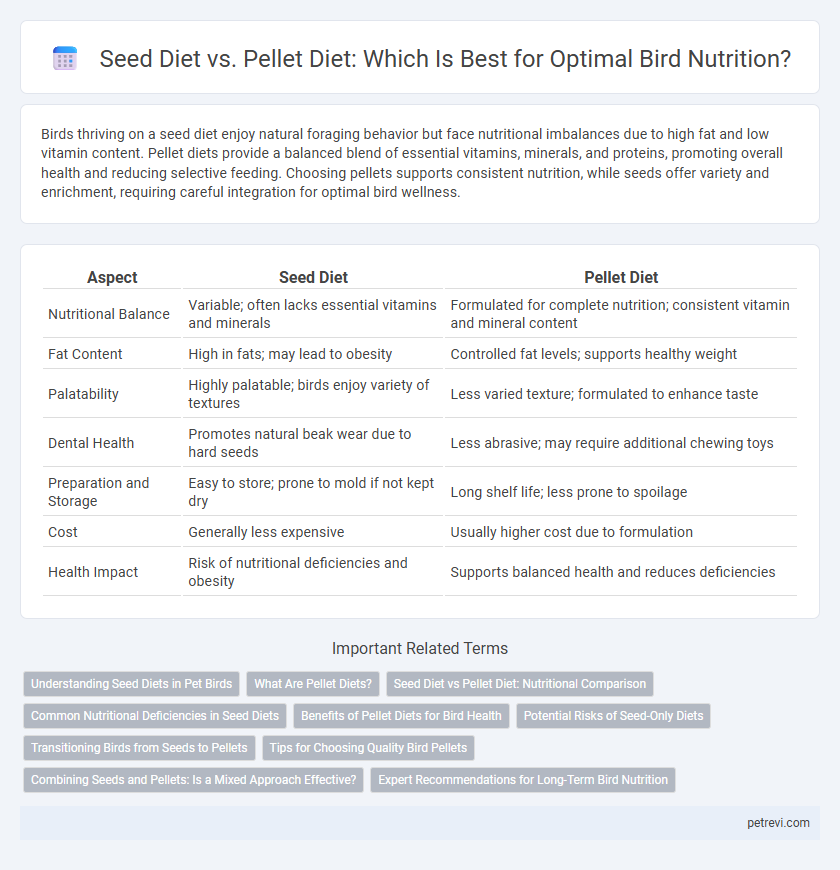Birds thriving on a seed diet enjoy natural foraging behavior but face nutritional imbalances due to high fat and low vitamin content. Pellet diets provide a balanced blend of essential vitamins, minerals, and proteins, promoting overall health and reducing selective feeding. Choosing pellets supports consistent nutrition, while seeds offer variety and enrichment, requiring careful integration for optimal bird wellness.
Table of Comparison
| Aspect | Seed Diet | Pellet Diet |
|---|---|---|
| Nutritional Balance | Variable; often lacks essential vitamins and minerals | Formulated for complete nutrition; consistent vitamin and mineral content |
| Fat Content | High in fats; may lead to obesity | Controlled fat levels; supports healthy weight |
| Palatability | Highly palatable; birds enjoy variety of textures | Less varied texture; formulated to enhance taste |
| Dental Health | Promotes natural beak wear due to hard seeds | Less abrasive; may require additional chewing toys |
| Preparation and Storage | Easy to store; prone to mold if not kept dry | Long shelf life; less prone to spoilage |
| Cost | Generally less expensive | Usually higher cost due to formulation |
| Health Impact | Risk of nutritional deficiencies and obesity | Supports balanced health and reduces deficiencies |
Understanding Seed Diets in Pet Birds
Seed diets for pet birds often consist of millet, sunflower seeds, and safflower seeds, providing a high-fat, high-fiber food source that appeals to natural foraging behaviors. While seeds offer essential fats and some proteins, they frequently lack a balanced profile of vitamins and minerals necessary for optimal avian health. Relying solely on seed diets can lead to nutritional deficiencies such as hypovitaminosis A and calcium imbalance, highlighting the need for dietary variety or supplementation.
What Are Pellet Diets?
Pellet diets for birds consist of compressed, nutritionally balanced formulas designed to provide complete and consistent nutrition, reducing selective feeding seen in seed diets. Unlike seed diets that are high in fat and often lack essential vitamins and minerals, pellet diets ensure optimal intake of proteins, vitamins, and minerals necessary for maintaining bird health and preventing deficiencies. These diets support better digestion and enhance immune function in birds by offering stable nutrient content in every serving.
Seed Diet vs Pellet Diet: Nutritional Comparison
Seed diet for birds primarily offers high-fat content and natural variety but often lacks balanced vitamins and minerals, leading to potential nutrient deficiencies. Pellet diet provides a scientifically formulated balance of proteins, vitamins, and minerals, promoting optimal health and preventing selective eating behaviors. Nutritional comparison reveals pellets support consistent nutrient intake, while seed diets require careful supplementation to meet all essential dietary needs.
Common Nutritional Deficiencies in Seed Diets
Seed diets for birds often lack essential vitamins and minerals such as vitamin A, calcium, and iodine, leading to common nutritional deficiencies. Prolonged reliance on seeds can result in issues like poor feather quality, weakened immune systems, and metabolic bone disease. Pellet diets provide a more balanced nutrient profile, ensuring birds receive essential nutrients critical for optimal health and development.
Benefits of Pellet Diets for Bird Health
Pellet diets for birds offer balanced nutrition by providing consistent levels of essential vitamins, minerals, and proteins, which can reduce the risk of selective feeding and nutritional deficiencies common in seed-based diets. These diets support better digestive health and enhance plumage quality due to their formulated ingredients tailored to specific bird species. Furthermore, pellet diets contribute to longer lifespan and improved immune function by promoting overall dietary consistency and nutritional adequacy.
Potential Risks of Seed-Only Diets
A seed-only diet for birds often lacks essential vitamins and minerals, leading to nutritional deficiencies such as hypovitaminosis A, iron storage disease, and obesity. Seeds are typically high in fat and low in protein, calcium, and other vital nutrients, increasing the risk of fatty liver disease and weakened immune function. In contrast, incorporating formulated pellets ensures a balanced intake of nutrients, reducing the health risks associated with seed-only diets.
Transitioning Birds from Seeds to Pellets
Transitioning birds from a seed diet to pellets enhances nutritional balance by providing essential vitamins and minerals often lacking in seeds. Gradual introduction of pellets mixed with seeds helps reduce stress and encourages acceptance, ensuring a smoother dietary shift. Monitoring bird health and behavior during this transition supports optimal nutrition and overall well-being.
Tips for Choosing Quality Bird Pellets
When selecting quality bird pellets, prioritize those with a balanced nutrient profile including essential vitamins, minerals, and amino acids that support overall avian health. Look for pellets made from natural, non-GMO ingredients without additives or preservatives to avoid potential toxins. Consider pellet size and texture suitable for your bird species to ensure easy consumption and optimal digestion.
Combining Seeds and Pellets: Is a Mixed Approach Effective?
Combining seeds and pellets in bird nutrition offers a balanced approach that enhances nutrient diversity and supports overall health. Seeds provide natural fats and fiber, while pellets deliver essential vitamins and minerals in a controlled form, reducing selective feeding behavior. Studies show that mixed diets improve digestive efficiency and promote optimal weight management compared to seed-only or pellet-only feeding.
Expert Recommendations for Long-Term Bird Nutrition
Expert recommendations emphasize a balanced seed and pellet diet for long-term bird nutrition, as pellets provide essential vitamins and minerals often lacking in seeds. Seeds alone can lead to nutritional deficiencies and obesity due to their high fat content, while pellets ensure consistent intake of protein, calcium, and antioxidants. Incorporating fresh fruits and vegetables alongside pellets supports optimal health and longevity in pet birds.
Seed diet vs Pellet diet for Bird nutrition Infographic

 petrevi.com
petrevi.com